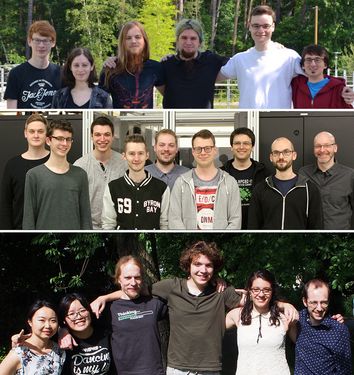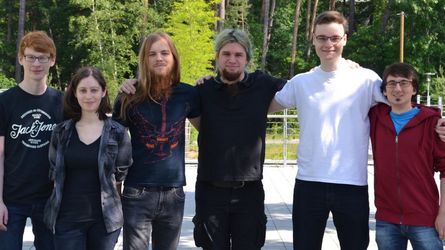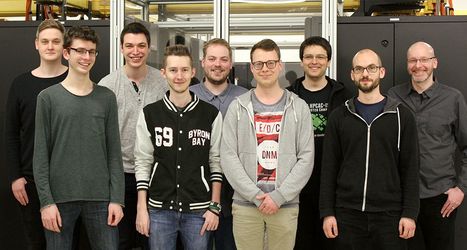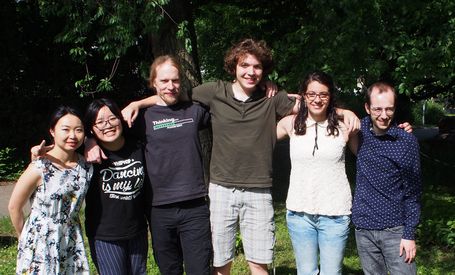NEWSFLASHES
Meet the German Teams Competing in ISC18 Student Cluster Competition
News Flash 08/2018 –

The German SCC teams (top to bottom): Friedrich-Alexander-Universität Erlangen-Nürnberg, Universität Hamburg, Universität Heidelberg
The Gauss Centre for Supercomputing (GCS) is sponsoring three German student teams competing in the Student Cluster Competition (SCC) at the 2018 International Supercomputing Conference (ISC 2018), taking place June 24–28 in Frankfurt, Germany. Twelve teams will participate in the competition, including the three German teams representing Friedrich-Alexander-Universität Erlangen-Nürnberg (FAU), Universität Hamburg, and Heidelberg University.
Taking place at both the ISC and the SC supercomputing conferences every year, the SCC is an international contest for undergraduates from a variety of disciplines and background to test their high-performance computing (HPC) skills in real time. The fast-paced, three-day competition requires the student teams to build their own clusters and run a variety of applications and benchmarks. Along the way, teams are exposed to different scenarios, such as an unannounced power outage or pop quizzes to test their HPC knowledge. Teams are judged on application performance and accuracy as well as their systems’ energy efficiency.
GCS has sponsored SCC teams for 4 consecutive years in order to encourage students to take a deeper interest in HPC and develop more HPC skills in Germany. This is the first time GCS has helped three German teams participate in the event. “One of GCS’ primary missions is supporting HPC education, and we are proud to be assisting three German teams—our most ever—in this year’s competition,” said Dr. Claus-Axel Müller, Managing Director of GCS.

Team “Danger High FAUltage” from Friedrich-Alexander-Universität Erlangen-Nürnberg (FAU) comprises students from the different fields of computational engineering, computer science, and chemistry. From left: Alexander Lieret, Alina Öz, Raphael Mayr, Christian Vögl, Christian Zöllner, Tobias Müller.
Copyright: FAUTeam "Danger High FAUltage", Friedrich-Alexander-Universität Erlangen-Nürnberg
This year’s team from Friedrich-Alexander-Universität Erlangen-Nürnberg (FAU), “Danger High FAUltage”, comprises one female and five male students from the different fields of computational engineering, computer science, and chemistry. This mix of different disciplines combines both theoretical knowledge and practical experience, making the team prepared on all fronts. Although the team is made up entirely of first-time participants, they find themselves eager for the challenge: “We are looking forward to this unique experience, where we can meet people from other countries and students who share our interest in HPC,” says team member Christian Zöllner. “We have been working on our skills for two semesters and are excited to put them to use and have fun.”
For now, the team is focused on preparing as thoroughly as possible to leave no room for unwelcome surprises. Time will be scarce during the competition, so every bit of previously gathered information and know-how will be invaluable, especially to gain extra headroom to deal with unforeseen challenges. This will give them an edge over less-prepared competitors.
The team is organized into groups focussing on different applications and benchmarks. They also have a cluster administrator and a team captain who serves as the spokesperson. Hewlett Packard Enterprise sponsors the team and provided two dual-socket Broadwell-EP nodes, each equipped with 256GB of memory and eight NVIDIA Tesla V100 GPUs.

The team from Universität Hamburg features students with a background in informatics, software systems development, computing in science, and information systems. Left to right: Julius Plehn, Daniel Bremer, Johannes Coym, Michael Blesel, Jannek Squar, Leonhard Reichenbach, Michael Kuhn, Niklas Wittmer, Oliver Pola.
Copyright: Universität HamburgTeam from Universität Hamburg
The team from Universität Hamburg (Twitter) features students with a background in informatics, software systems development, computing in science, and information systems. Most team members participated in last year’s competition or helped with the preparations for 2017. The team is divided into different groups, namely operating and file systems, benchmarks, and the various applications. Each group has two experts, but the students are also involved with the other groups to ensure that everything will run smoothly during the competition.
The team stands out due to its hardware. The latest SCC trend is for teams to have NVIDIA GPUs, whereas the Hamburg team’s cluster is using twelve Intel Xeon Phi 7250F CPUs with Omni-Path interconnects. They say it gives them an advantage when it comes to applications that are not explicitly targeting GPUs. On the other hand, they anticipate that the High-Performance Linpack (HPL) benchmark and the AI application will be challenging. Another issue is the team’s distributed file system, which posed major problems last year. Due to the Intel Xeon Phis unusual architecture, file systems have a hard time delivering optimal performance. This year, the team is confident to be able to overcome the challenges posed by their system.
For the Hamburg team, SCC is a unique chance to get their hands on state-of-the-art hardware they otherwise would not be able to access. “We are excited to take part in one of the world’s biggest HPC conferences, see new trends in HPC, and meet the HPC community,” says team member Leonhard Reichenbach.

Heidelberg University is a newcomer to the SCC at ISC. The team members study physics, mathematics, scientific computing, and applied computer science. From left to right: Zihan Liu, Yajie Liang, Erik Schnetter, Bálint Soproni, Susanne de Vasconcelos Barros Malheiros, Aksel Alpay.
Copyright: Heidelberg UniversityTeam from Heidelberg University
The team from Heidelberg University profits from its diversity. The team is evenly divided between males and females, and the team members study physics, mathematics, scientific computing, and applied computer science. The team also features a wide range of student experience levels, with team members being anywhere from second-year students to in their final year of undergraduate studies.
This is the first time that Heidelberg University will send a team to the SCC at ISC, and the team emphasizes the importance of teamwork and knowledge transfer. The students divided the tasks according to preferences and specialties. To prepare, they also studied the hardware configurations of previous benchmarks at ISC and came up with strategies to tackle different challenges. The team works with Tesla V100 GPUs in an Intel Xeon Skylake system. They say the raw compute performance of the Tesla V100 GPUs will give them an advantage for benchmarks that are optimized for GPUs, while the V100's tensor cores will additionally boost the performance of the AI application in particular. For benchmarks that do not support GPUs, the AVX512 CPU instructions of Xeon Skylake CPUs are expected to boost performance. “Technology fascinates us and we are thrilled to work with brand-new hardware combined with an enthusiastic team,” says team member Aksel Alpay. “We are looking forward to meeting people from other universities, HPC experts, and potential employers.“ While the Heidelberg team is new to the SCC and cannot rely on the know-how of predecessors, they are motivated to win: “Of course we're the best team,” Alpay says with a smile.
-Amelie Liebgott